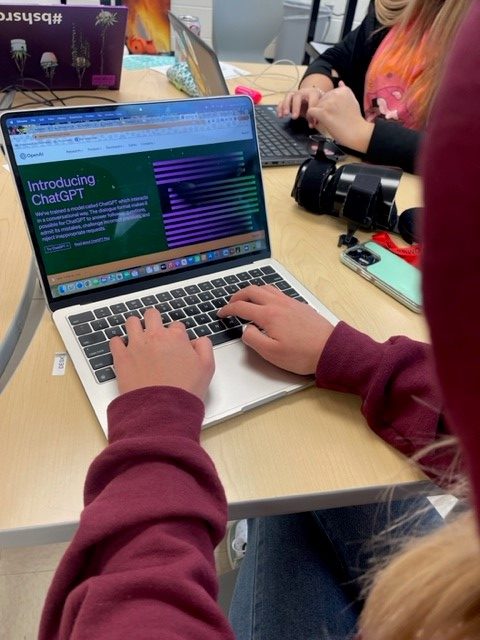Artificial intelligence takes over assignments
A Big Spring High School student works within the classroom on school assignments, while easily having ChatGPT open in another tab.
May 4, 2023
In November of 2022, ChatGPT was released onto the Internet. Little was known the impact this website would have on society, and specifically within the education system. According to their website, this OpenAI allows for anyone to get onto the website and interact with ChatGPT in a conversational format to instruct the user with the information upon their request. While the AI can be a great helping hand if assistance is needed in finding out what to make for dinner or creating a bedtime story, it is becoming a huge concern for school districts throughout the country.
The question has arisen of whether or not students using ChatGPT for their school assignments is considered plagiarism. Because this is an AI creating the work, and not a human, many different principals, teachers and instructional directors are left with the question of declaring the use of ChatGPT for school assignments, plagiarism. Nicole Donanto, Curriculum and Instruction Director for Big Spring High School, said, “At this time, I see this as academic dishonesty; it is something that our students should not be doing because it is not their true work. But as far as plagiarism, I have talked at different conferences with many different people about the topic, and right now everyone is on the same page, regarding that it is not plagiarism because the work is not being stolen from an actual human.” This is a commonly seen viewpoint throughout other districts, and this is unlike any other program seen before. Schools will need time to construct rules around it.
Brooke Markle, Big Spring High School’s Instructional Director, said, “I think that if the assignment is expecting for the student to do their own work, then I think it would be considered plagiarism, because they are not doing their own work. When you look at plagiarism, it is taking someone else’s words or ideas and not crediting them.” The argument still remains of whether using words from artificial intelligence is plagiarism or just academic dishonesty, and many students don’t understand this difference.
Kaleb Miller, a sophomore at the high school, says, “Yes, I have heard of ChatGPT and actually used the website for my English class. ChatGPT was accurate for my assignment, and my teacher did not catch on to me using it.” It is no secret to teachers at this point that they need to be more aware of students taking advantage of this AI within the classroom. Courtney Rickabaugh, a teacher in the English department, said, “ Since ChatGPT has been released, I think twice about what method, as in paper or computers, I am going to use for my assignments.” Many teachers are changing a lot of their online class assignments to paper, to enable students from having access to their electronic devices. Hopefully, not giving students the chance or opportunity to use ChatGPT, rather than their own thoughts and ideas.
The popular social media app, Snapchat, has also created an AI in the user’s feed, as if it was a real person to converse with. Snapchatters can ask this AI anything from “Write me an article on WWII” to “Create me a love letter for my boyfriend/ girlfriend” and the AI will have either one prepared in a matter of seconds. At the rate this technology is growing, there is no possible way to stop or hide this artificial intelligence but to evolve and adjust to this new technology.
For the rest of this school year, Big Spring plans to move forward with allowing students another chance at the assignment if they are caught using the AI for any assignments. Whether or not the rules regarding this topic will change by next year is to be determined, but what is known is that it will be impossible for school districts to put a stop to such a fast growing technology.
